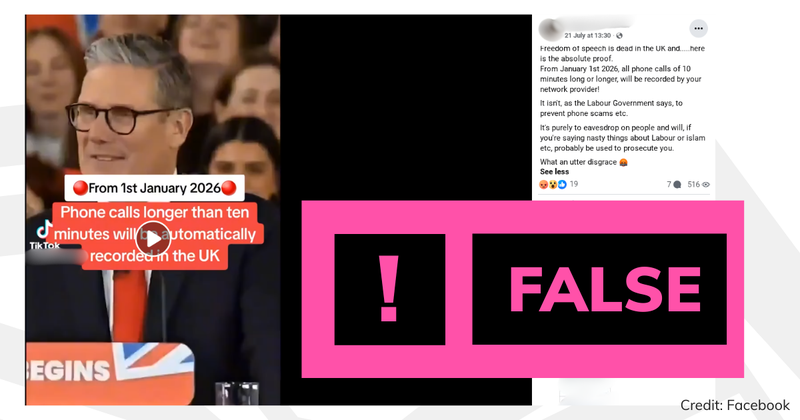What was claimed
From 1st January 2026, phone calls longer than 10 minutes will be automatically recorded in the UK.
Our verdict
False. Ofcom confirmed there are no such requirements on telecoms providers.
What was claimed
From 1st January 2026, phone calls longer than 10 minutes will be automatically recorded in the UK.
Our verdict
False. Ofcom confirmed there are no such requirements on telecoms providers.
Social media posts claiming that from 1st January 2026 phone calls longer than 10 minutes will be automatically recorded in the UK have been shared hundreds of thousands of times online.
The posts claim this is part of a new regulation introduced by the Home Office and approved by Ofcom, but it isn’t true.
Ofcom told us there are no such requirements on telecoms providers.

Videos circulating online claim that “all calls made from mobile or landline numbers that last more than 10 minutes will be automatically recorded and stored by your network provider” and “will be kept securely for up to 30 days after which they will be deleted unless officially requested by law enforcement or the courts”.
The videos claim this is part of a “broader strategy to combat telephone scams, organised fraud and criminal networks using encrypted or untraceable communication” according to “a leaked policy draft reported by the Guardian”.
Join 72,953 people who trust us to check the facts
Sign up to get weekly updates on politics, immigration, health and more.
Subscribe to weekly email newsletters from Full Fact for updates on politics, immigration, health and more. Our fact checks are free to read but not to produce, so you will also get occasional emails about fundraising and other ways you can help. You can unsubscribe at any time. For more information about how we use your data see our Privacy Policy.
But the Guardian told us that “this is not and never has been a Guardian article”. We have also contacted the Home Office about these claims, and will update this article if we receive a response.
The earliest version of this claim we could find was posted by a TikTok account on 17 July. We have written several fact checks about videos posted by this same account in recent weeks, including false claims that going abroad four times a year will flag you to HMRC for ‘enhanced customs monitoring’ from August and purchases over £1,000 will be automatically reported to HMRC from 2026. We have been unable to contact the account as their direct messages are turned off.
Before sharing content like this that you see on social media, first consider whether it comes from a trustworthy and verifiable source. Our toolkit gives you advice on how to navigate bad information online.
This article is part of our work fact checking potentially false pictures, videos and stories on Facebook. You can read more about this—and find out how to report Facebook content—here. For the purposes of that scheme, we’ve rated this claim as false because Ofcom confirmed there are no such requirements on telecoms providers.
Full Fact fights for good, reliable information in the media, online, and in politics.
Bad information ruins lives. It promotes hate, damages people’s health, and hurts democracy. You deserve better.
Subscribe to weekly email newsletters from Full Fact for updates on politics, immigration, health and more. Our fact checks are free to read but not to produce, so you will also get occasional emails about fundraising and other ways you can help. You can unsubscribe at any time. For more information about how we use your data see our Privacy Policy.